Redditor Tells Roommate To Get Rid Of His New Cat Because They Are Only Allowed One Pet Per Unit, Chaos Ensues
Isn’t it just awesome to live together with your best friend? Think of unlimited slumber parties and late-night snacks WITH your ride-or-die friends, however, if ever the time comes that your friends’ true colors will show… be prepared for every scenario.
It is not a bad thing to argue with your roommate and best friend, but if it goes around for a long time that your properties or maybe even your pet/s are abused or ignored so that you can push your choices, it’s time to think twice.
Mind you, it’s really okay to share and place things on your side especially when you’re living with someone, however, you get to be the one stressed if a contract rule and fees are involved and taken advantage of.
Now, in this episode of AITA, the OP’s long-time friend, Brett, overlapped his share as to be a roommate - he went way overboard, really. You might want to read the back story.
To think, it’s not a battle between Noodle and Missy, but Brett and his attitude. The OP wants to know if she’s the asshole for telling her roommate to get rid of Missy for the sake of Noodle. read this interesting story below:
Here's the post under the r/AITA subcommunity:

They have been friends for ten years now, and OP was the one who originally had a cat. It has been with them for ten years

They were only allowed one pet per unit but...
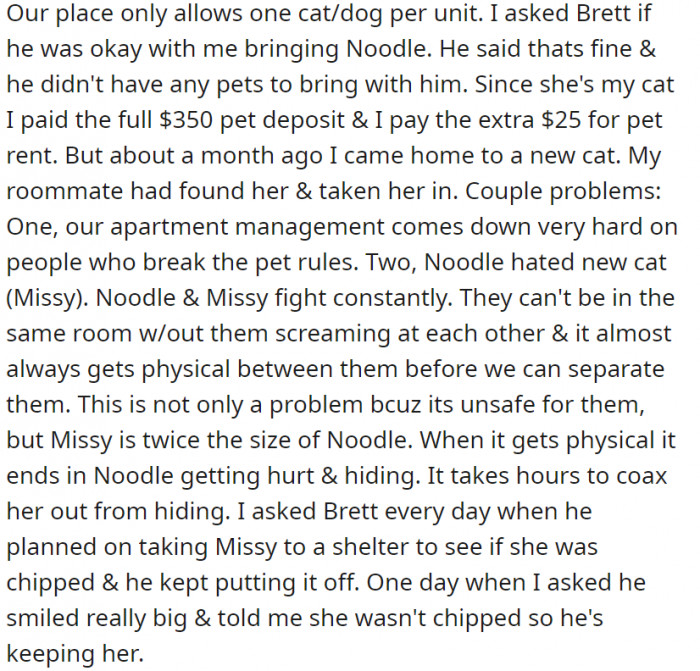
Understanding the Dynamics of Shared Living
Living with roommates can be challenging, especially when it comes to adhering to rules. Social psychologists emphasize that boundaries in shared spaces are vital for maintaining harmony. When one person feels the rules are being broken, resentment can quickly build.
In this case, the tension between adhering to the pet policy and the emotional attachment to the new cat is palpable. Research indicates that perceived fairness in shared living situations is essential for satisfaction and overall well-being.
Understanding Rule Enforcement in Shared Living Spaces
Setting rules in shared living environments can be a double-edged sword. On one hand, they provide structure; on the other, they can provoke conflict when enforced rigidly.
Dr. Susan H. Fiske, a social psychologist, points out that rule enforcement often triggers feelings of injustice, especially when one party feels unfairly targeted.
This dynamic can foster resentment and lead to emotional confrontations, as seen in this case where chaos ensued over a pet rule.
Brett brought in a new cat, and that did not exactly bode well with Noodle.

What do you think?
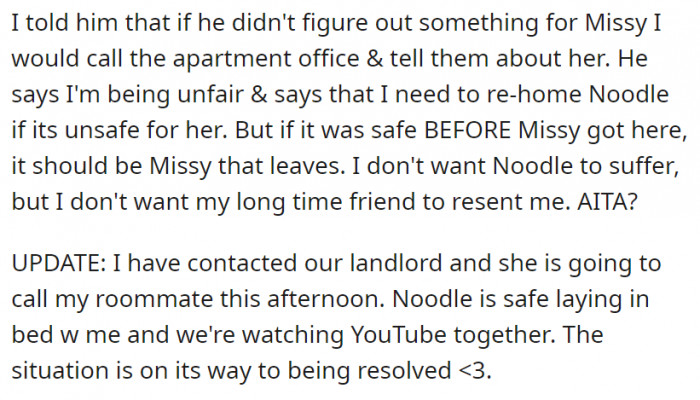
Here's update number two:
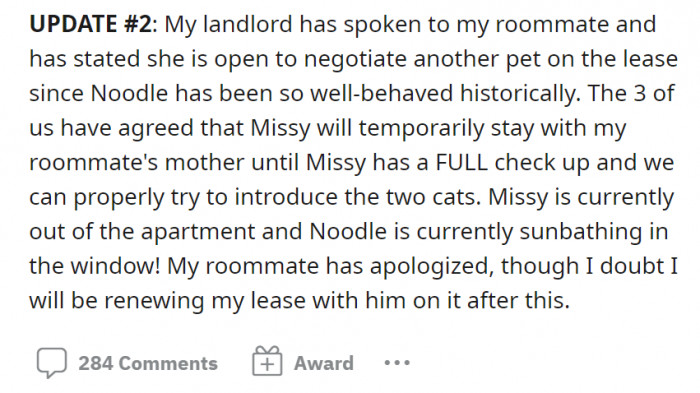
Moreover, the chaos that ensues from rule-breaking often highlights deeper issues of trust and respect among roommates. According to Dr. Alexandra Solomon, a relationship therapist, "Trust is the foundation of any healthy relationship, and when it is compromised, conflict is inevitable." Acknowledging this, she emphasizes the importance of open communication to rebuild trust. Therefore, addressing the root causes of this conflict is crucial for resolution.
Research shows that when individuals perceive rules as arbitrary or unfair, their compliance decreases significantly. According to Dr. Adam Grant, an organizational psychologist, "When people feel their autonomy is threatened, they are more likely to push back against authority and established norms." This sentiment is echoed by Dr. Daniel Goleman, an emotional intelligence expert, who states, "Resistance often arises when individuals believe their rights are being infringed upon, leading to conflict." These insights highlight the potential for discord when rules are perceived as unjust.
Here are the people who voiced out their thoughts:
Let’s add this to one of the worst case scenarios.

We all get it. Missy is a good cat, but rules are rules!

Nice suggestion!

The Role of Boundaries in Relationships
Boundaries are essential in any relationship, and their violation can lead to significant distress. According to Dr. Henry Cloud, a clinical psychologist, clear boundaries help individuals feel safe and respected. When roommates disregard established rules, it can lead to feelings of violation and resentment.
Establishing explicit agreements about pet ownership and other shared responsibilities can help avoid future conflicts.
The Emotional Toll of Conflict
Conflict, especially regarding pet ownership, can heighten stress and anxiety levels in a shared living situation.
Studies have shown that unresolved disputes can lead to a toxic living environment, impacting mental health and overall well-being.
For instance, heightened cortisol levels are commonly associated with ongoing conflict, which can lead to both physical and emotional exhaustion.
Brett, please read!

I bet Missy is a good cat, but his “owner” doesn’t respect the fact that Noodles was living with them legally.

OP, don’t wait for the landlords to scold a thing you didn’t even intentionally agree with. And yes, the most important thing, protect Noodle!
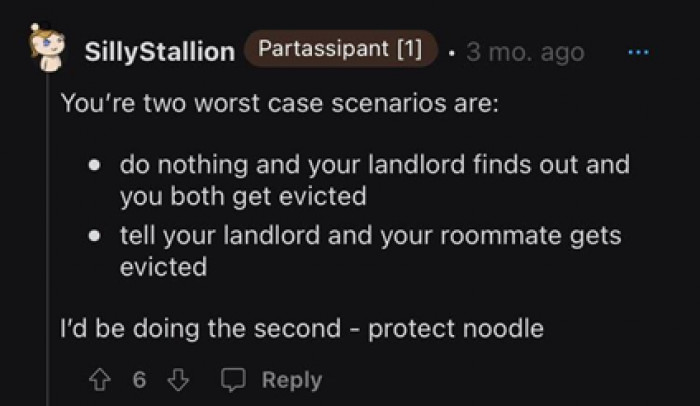
In situations like this, open communication is vital. Research shows that effective communication strategies can de-escalate tensions and promote understanding. For instance, using active listening techniques can help each party feel heard and validated, paving the way for compromise.
Regular discussions about household rules and responsibilities can also prevent misunderstandings from escalating into chaos.
Psychological experts emphasize the importance of emotional intelligence in navigating roommate conflicts. According to Dr. Alexandra Solomon, a relationship therapist, "Emotional intelligence allows us to understand our own feelings and those of others, which is essential for resolving conflicts and fostering healthy relationships." Furthermore, Dr. Dan Gilbert, a happiness researcher, notes that "People who are emotionally intelligent are typically more adept at managing interpersonal disputes, which can lead to more harmonious living situations." These insights highlight how emotional intelligence could have played a significant role in resolving the roommate's dilemma.
True! Noodles is the real deal. But again, the problem doesn’t lie with the cats… because they’re just cats.

That is completely right. Unless Brett had already a jealousy thing going on… who knows?

How manipulative! Enough with all the excuses.

Resolution Strategies for Roommate Conflicts
Conflict resolution strategies can be beneficial in navigating roommate disputes effectively. Dr. Jonathan Haidt, a social psychologist, emphasizes that "collaborative problem-solving approaches that involve both parties can lead to more constructive outcomes." His insights can be found on his professional website, jonathanhaidt.com. Encouraging roommates to express their feelings and propose solutions fosters a cooperative spirit, which is crucial for resolving conflicts amicably.
Practical Steps for Resolution
To address conflicts effectively, roommates should establish a set of shared guidelines that respect individual needs while promoting harmony.
Facilitating regular check-ins can help ensure all voices are heard, preventing issues from escalating.
Additionally, mediation can be a useful tool; involving a neutral third party can help clarify misunderstandings and foster a more collaborative atmosphere.
Noodles, ftw!

Noodle and Missy not being friendly to each other aren’t the problems! There’s a lease contract and that’s the very stress OP needs to face.
Anyway, true, Brett surprisingly brought Missy home which is a huge disrespect to Noodle and the OP.

Brett, oh, Brett… good luck to however this situation is going to end.

Ultimately, understanding each other’s perspectives can facilitate a healthier living environment. Conflict is often a signal for change, and addressing it constructively can lead to better relationships. By prioritizing empathy and compromise, roommates can transform chaotic situations into opportunities for growth and understanding.
A proactive approach to communication and rule enforcement can significantly improve the quality of shared living experiences.
No one said it better. It’s all about mindset!

You, friend, are absolutely right. There is only one answer, listen to this user!
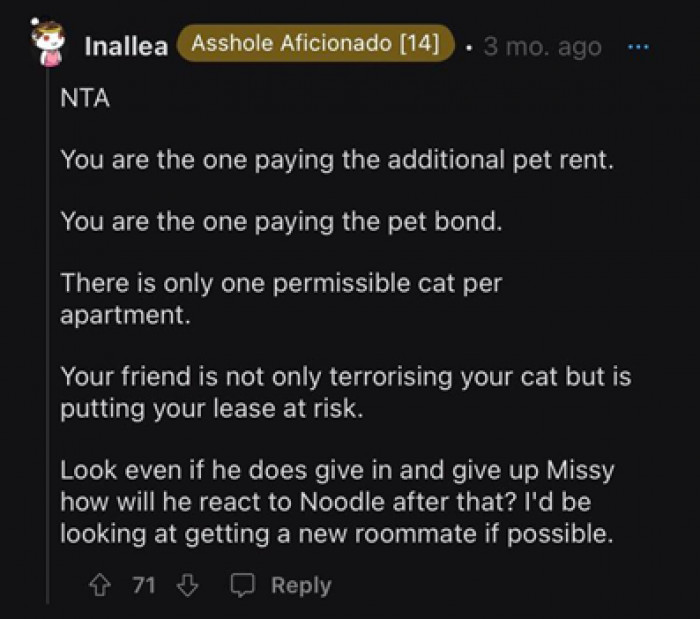
Hey, OP, looking for a second opinion? Here it is.

Truth hurts, Brett! @Izziefans said so and the 147 people who agreed with her.

Someone had to say it. Thanks @Bear_Cub_15!

OP, you’ve had enough! This is a sign, really.

The situation is very clear.

Landlord saves the day! And yes, we don’t want any cats to get hurt.

So, what do you think? It’s so unfair for the OP to be the only one stressing about this when Brett seriously needs to take accountability, honestly speaking!
However, we hope that this case will be resolved soon and that both cats will be happy … and best friends too. Comment down your thoughts, or share this article for all your family and friends to see!
Psychological Analysis
This scenario illustrates the complexities of shared living arrangements, where differing values and needs can clash dramatically.
Our in-house psychologist notes that establishing clear expectations and fostering open dialogue are essential to maintaining a peaceful coexistence, especially in emotionally charged situations like this one.
Analysis generated by AI
Analysis & Alternative Approaches
In summary, the dynamics of roommate relationships often hinge on effective communication and emotional intelligence.
According to Dr. William Doherty, a family therapist, "Understanding each other's emotional needs is crucial in resolving conflicts and fostering a harmonious living environment." He emphasizes that recognizing emotional triggers can lead to healthier interactions among roommates.
Analysis & Alternative Approaches
In summary, navigating roommate conflicts requires a commitment to open dialogue and mutual respect. Research supports the need for clear boundaries and effective communication in resolving disputes.
By implementing collaborative strategies and fostering understanding, individuals can create more harmonious living situations.



